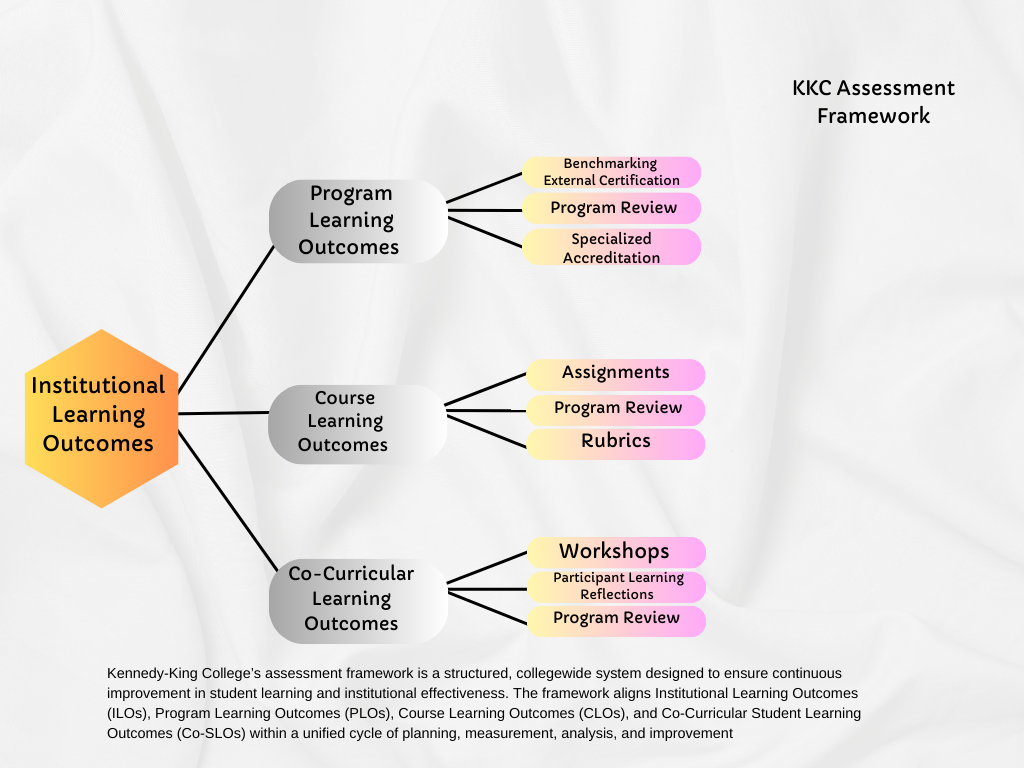Institutional Learning Outcomes
In an increasingly dynamic world, a college must clearly state its educational philosophy in terms of the outcomes it seeks to create for its graduates.
Kennedy-King College has identified six key Institutional Learning Outcomes (ILOs) that encompass the skills and knowledge we believe that all students should have upon completion of a degree, regardless of discipline, so that they will be well equipped to reach their full potential and successfully compete in the global marketplace.
KKC’s Institutional Learning Outcomes
Our Graduates WILL BE ABLE TO Practice / Exercise:
1. Communication
Communicate effectively in various modalities.
Evidence of having met this SLO could include:
- Convey and interpret ideas in written form in Standard American English
- Convey and interpret ideas verbally in SAE
- Convey and interpret ideas using a visual medium
- Convey and interpret ideas in a foreign language
- Comprehend information presented in written, verbal, or visual media.
- Analyze information presented in written, verbal, or visual media.
2. Quantitative literacy
Utilize and interpret numerical data.
Evidence of having met this SLO could include:
- Correctly construct and interpret a chart, graph, or table
- Use data presented to evaluate an argument.
- Use data generated or collected to support an argument
- Utilize data in problem solving
- Recognize the limits of data (including in theoretical models)
- Use mathematics to solve problems
- Apply quantitative reasoning in real-world scenarios.
3. Technological and Information Fluency
Use current technology and information literacy strategies to achieve a desired outcome
Evidence of having met this SLO could include
- Use of technology to locate information relevant to a specific task, purpose, or question.
- Critically evaluate quality and reliability of information.
- Use of technology to convey information to others (i.e. creation of a PPT)
- Create digital artifacts such as documents, databases, programs, art, etc.
- Utilize technology to complete a task such as submitting an assignment, completing an online job application, applying to financial aid, etc.
- Demonstrate an understanding of a digital footprint and the potential impact of a digital footprint on life.
4. Problem Solving
Understand and apply appropriate problem-solving strategies to help solve real-world and novel problems.
Evidence of having met this SLO could include:
- Identify and apply discipline specific knowledge to solve novel problems.
- Applying knowledge from one discipline to solve a problem in another.
- Correctly identify an issue.
- Apply mathematical formulas or methodologies to solve a problem.
- Suggest appropriate methodologies/theories to apply
- Propose a solution to a stated problem.
5. Global Citizenship
Demonstrate knowledge of competent and ethical practices in diverse local and global contexts.
Evidence of having met this SLO could include:
- Displaying an understanding of the issues facing people of different cultures, religions, genders, sexualities, socioeconomic classes, races etc.
- Drawing connections between course material and its societal importance/impact
- Explain the importance of sustainable practices and environmental stewardship.
- Understanding of local, state, or global issues.
- Drawing connections between course material and social, political, and economic contexts.
6. Personal Development & Creativity
Employ practices that promote creativity and holistic well-being.
Evidence for having met this SLO could include:
Demonstrate appreciation for artistic expression
- Creating artistic works
- Reflecting on or utilizing practices that promote well-being (physical/psychological/emotional).
- Applying practices that result in an increased sense of well-being.
Foundational skills
- Understanding the physical, psychological, and emotional benefits of physical activity.
- Understand the impacts of diet on physical and emotional well-being.

